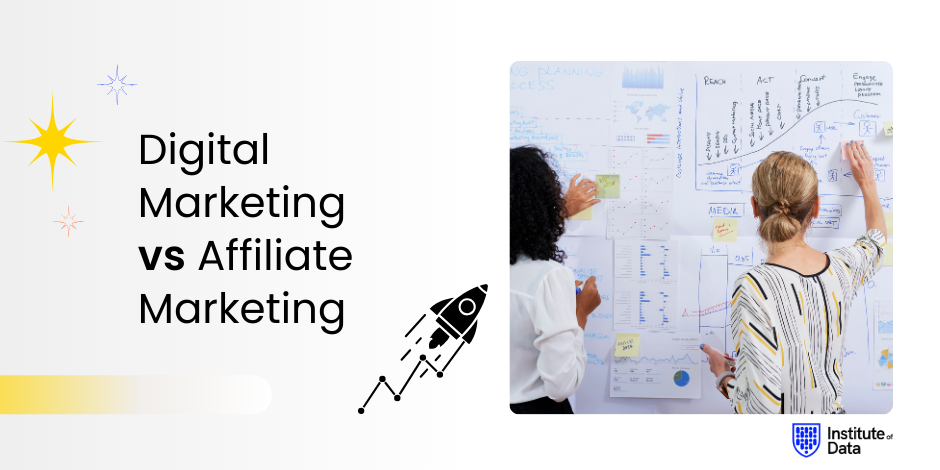Digital Marketing vs Affiliate Marketing: A Comprehensive Comparison

Stay Informed With Our Weekly Newsletter
Receive crucial updates on the ever-evolving landscape of technology and innovation.
Digital and affiliate marketing are two popular marketing strategies businesses use to promote their products or services online.
When considering digital marketing vs affiliate marketing, organizations must understand their unique drawbacks and benefits when choosing the most suitable approach for their goals.
Understanding the basics of digital marketing

Digital marketing refers to promoting products or services through digital channels like websites, social media platforms, search engines, and email marketing.
The role of digital marketing in today’s business world
Digital marketing is vital in helping businesses reach their target audience effectively.
It allows businesses to use various strategies, such as search engine optimization (SEO), content marketing, paid advertising, social media marketing, and email marketing, to drive relevant website traffic and convert them into loyal customers.
Key components of digital marketing
There are several key components of digital marketing to consider when devising their marketing strategy, including:
- SEO: Optimising websites and content to rank higher in search engine results and increase visibility.
- Content marketing: Creating informative and valuable content to attract and engage the target audience.
- Social media marketing: Utlising social media platforms to build brand awareness, connect with their audience and customers, and drive traffic to the website.
- Email marketing: Sending targeted and personalized emails to nurture leads and drive conversions.
- Paid advertising: Using online advertisements, such as pay-per-click (PPC) ads, to increase visibility and generate leads.
Delving into the world of affiliate marketing
Affiliate marketing is a performance-based marketing strategy in which organizations reward affiliates for each customer or sale generated through their referral.
It operates on revenue sharing, where affiliates receive a commission for promoting products or services.
The concept of affiliate marketing explained
In affiliate marketing, businesses create an affiliate program and provide affiliates with unique referral links or codes.
Affiliates then promote these products or services through various channels, such as email marketing, blogs, websites, and social media, earning a commission each time a sale is made through their referral.
How affiliate marketing works
When a customer clicks on an affiliate’s referral link and makes a purchase, the system tracks the referral and attributes the sale to the affiliate.
This is usually done through tracking cookies or other tracking mechanisms.
Depending on the affiliate program’s structure, affiliates can earn a fixed commission per sale or a percentage of the sale value.
Digital marketing vs affiliate marketing

While both digital and affiliate marketing aim to promote products or services online, there are significant similarities between digital marketing vs affiliate marketing.
Similarities between digital and affiliate marketing
When looking at digital marketing vs affiliate marketing, it’s important to also consider their similarities:
- Targeted promotion: Both strategies allow businesses to target certain audiences based on their interests, demographics, or online behavior.
- Measurable results: Both strategies provide businesses with tools to track campaign performance and measure return on investment.
- Cost-effective: Digital and affiliate marketing can be cost-effective compared to traditional marketing, as organizations can allocate their budget based on performance and pay for results.
- Flexibility: Both strategies offer flexibility regarding campaign customization, scalability, and targeting options.
Distinct differences that set them apart
While both digital and affiliate marketing aim can help organizations and their online business, there are significant differences between digital marketing and affiliate marketing to consider.
- Control and ownership: In digital marketing, businesses have full control and ownership over their marketing channels, content, and brand. In affiliate marketing, businesses rely on affiliates to promote their products or services, giving up some control and ownership.
- Pricing models: Digital marketing often utilizes various pricing models, such as PPC or pay-per-impression, while affiliate marketing typically uses a commission-based pricing model.
- Relationships: Digital marketing builds customer relationships through branding, content, and engagement. In affiliate marketing, the relationship is between the business and the affiliate, who acts as a middleman between the business and the customer.
Choosing between digital and affiliate marketing
Businesses must consider several factors to make an informed decision when choosing between digital marketing vs affiliate marketing.
Factors to consider when choosing a marketing strategy
- Business goals and target audience: Assess your business goals and target audience to determine which strategy aligns best with your objectives and caters to your target audience’s preferences and behavior.
- Resource allocation and budget: Evaluate your resources, including personnel, expertise, and budget, to determine the feasibility of implementing digital marketing or affiliate marketing strategies.
- Control and scalability: Consider the level of control you desire over your marketing campaigns and the scalability of the chosen strategy to accommodate future business growth.
Pros and cons of digital marketing
Pros of digital marketing:
- Wide reach: Digital marketing allows businesses to reach a global audience and promote their services or products to many potential customers.
- Targeted advertising: With digital marketing, businesses can target specific audiences based on demographics, interests, or online behavior, increasing the chances of reaching the right customers.
- Measurable results: Using various analytics tools, organizations can track and measure the success of digital marketing campaigns, enabling them to optimize their strategies and allocate resources effectively.
Cons of digital marketing:
- High competition: The digital landscape is highly competitive, making it challenging for businesses to stand out and attract customer attention.
- Technical expertise: Digital marketing involves utilizing various platforms, tools, and techniques, requiring businesses to have technical knowledge or hire professionals to implement effective strategies.
- Time investment: Implementing and managing digital marketing campaigns can be time-consuming, as businesses must continuously monitor and optimize their strategies.
Pros and cons of affiliate marketing
Pros of affiliate marketing:
- Cost-effective: Affiliate marketing allows businesses to pay only for performance, making it a cost-effective strategy compared to traditional advertising models.
- Expanded reach: Affiliates can help businesses reach new audiences and markets that may be difficult to penetrate using traditional marketing channels.
- Third-party validation: Affiliates advocate for the business’s products or services, providing third-party validation to enhance trust and credibility among potential customers.
Cons of affiliate marketing:
- Dependency on affiliates: Businesses rely heavily on the quality and effort of their affiliates, which may vary. This can impact the effectiveness of the marketing campaign.
- Control and brand representation: Businesses must entrust their brand image and reputation to affiliates, which may only sometimes align with their desired messaging.
- Initial investment: Setting up an affiliate program and managing relationships with affiliates require an initial investment of time and resources.
Digital Marketing vs Affiliate Marketing: The future of digital and affiliate marketing

Both digital marketing and affiliate marketing are constantly evolving to adapt to the changing consumer landscape and emerging technologies.
Here are some emerging trends of digital marketing vs affiliate marketing:
Emerging trends in digital marketing
- Voice search optimization: With the rise of voice assistant devices like Google Home and Amazon Alexa, optimizing content for voice search is becoming increasingly important.
- Artificial intelligence (AI) and machine learning: AI-powered tools and algorithms enable businesses to automate and personalize marketing campaigns, improving targeting and customer experiences.
- Video marketing: Video content is gaining popularity across all digital platforms, providing businesses with an effective way to engage with their audience.
The evolving landscape of affiliate marketing
- Influencer marketing: Collaborating with influencers on social media platforms allows businesses to leverage their reach and influence to promote products or services.
- Affiliate management platforms: Affiliate management platforms simplify managing affiliates, tracking sales, and monitoring performance.
- Micro and nano affiliates: These small-scale affiliates with niche audiences can provide businesses with targeted promotion and higher conversion rates.
Digital Marketing vs Affiliate Marketing: Conclusion
Digital marketing and affiliate marketing are two strategies with their advantages and challenges.
Businesses should carefully assess their goals, target audience, resources, and preferences when choosing between digital marketing vs affiliate marketing.
By understanding the differences and similarities between digital marketing vs affiliate marketing, businesses can make an informed decision and develop an in-depth strategy that aligns with their specific objectives and drives success in the digital era.
Are you ready to nurture your passion for digital marketing?
The Institute of Data offers a range of in-demand tech accreditations to boost your career prospects.
We’ll get you job-ready with flexible learning and in-depth materials taught by industry professionals.
Visit our programs page to learn more, or book a complimentary call to discuss our programs in more detail.




